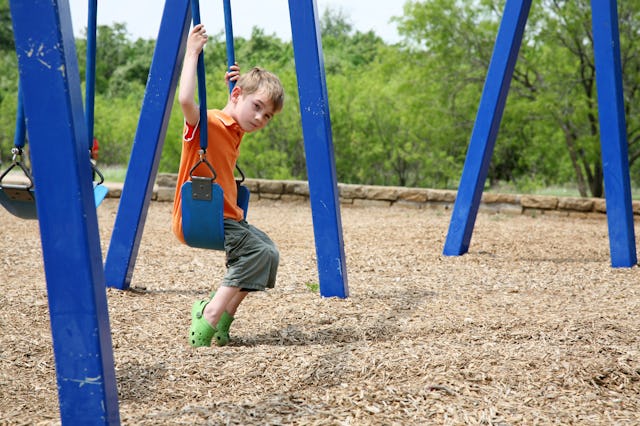The Day My Kid Totally Broke My Heart
I know exactly how awful it feels to be left out.

It was the last thing I expected to see when I opened my son’s backpack: “Sad day. Nobody wanted to play with me. No way.”
It was written across a piece of paper in his sweet, sloppy, misspelled kindergartener’s handwriting. Underneath that he drew himself standing in the rain with a sad face. Wrote his name and crossed it out. And my heart broke in a million pieces. My sweet, outgoing, kind boy had his heart hurt. He’s the kid who won’t let anyone be left out. But today, he was the one sitting alone.
Like any parent, I want to protect my child and ensure he’s never hurt physically or emotionally. I’d wrap him in bubble wrap if I could, but I know that won’t do him any favors. Life is never perfect or fair and through hard times we grow. That doesn’t mean I want him — or any child — to learn how it feels to be excluded. Especially as early as kindergarten.
My son has a big, outgoing personality. But he can also be anxious, terribly shy, and insecure, though he hides it well. It’s a unique combination of traits and most people only see him as happy and confident. As his mother, though? I know better. I can see when he is hesitant to insert himself in a group of his peers because he’s worried that he won’t be wanted or welcome. These are things we work on with him at home, but it doesn’t help when he comes home from school with his negative assumptions validated.
I know exactly how awful it feels for a child to be left out or even purposefully excluded. In third grade, I was one in a group of five friends — inseparable “best” friends. Until the day everyone decided that four was better than five and I was told in no uncertain terms that I was no longer welcome in the group. I felt crushed, heartbroken even. I couldn’t imagine what had transpired between morning recess and lunch that could lead to this. My questions were met with silence, and I spent the next few days at school sitting by myself until another classmate noticed and asked me to play.
That invite felt like a social life preserver, and I grabbed it with both hands. And even though it was only four fellow classmates that discarded me, it might as well have been every student in my school. I’ll never forget that feeling of being purposely ostracized. That’s been a big part of why I’ve always taught my son to look for the kids who seem sad or alone and ask them to play. To say hello and be aware of others’ feelings. And while I can do my best to instill this in him, I’m at the mercy of other parents and can only hope they do the same.
The day that he drew that picture, he sat alone at his desk while his friends made skyscrapers with blocks nearby. He said that he asked if he could play with them, but no one answered. I explained that they likely didn’t hear him because it can get loud in his classroom during free time and that while it was thoughtful of him to ask, he can always just sit down and play. But that day, for whatever reason, he didn’t feel like he could. That wasn’t the first time he’s felt that way. I’m sure it won’t be the last.
Sure, kids will be kids. And they say strange, mean, and funny things all the time. Their brains are a developmental work in progress, and they’re still learning to regulate their feelings and behaviors. They’re trying out different personalities, what feels good and what’s hurtful. They’re not necessarily being intentionally exclusive.
I can close my eyes and recall how it felt being in third grade and having my friends turn their backs on me. Or being the only mom standing alone in a park where everyone else was chatting and laughing with one another. Neither of those felt great, and something I try to keep in mind when I see a person looking alone and vulnerable. My son will often give me a confused look and ask, “Mommy, do you know that lady?” after I’ve sparked up a conversation with a fellow mom at Target or the playground. “No,” I’ll tell him. “But they looked like they could use a friend.”
Becky Vieira has been wearing mom jeans since 2016. She writes for a variety of parenting outlets, and can often be found oversharing intimate details of her life on Instagram. She's immensely proud of the time she thought to pee in one of her son's diapers while stuck in her car, as opposed to her pants.
Vieira’s debut book: Enough About the Baby: A Brutally Honest Guide to Surviving the First Year of Motherhood is a guide book for women who recognize the necessity of self-care—even if sometimes the rest of the world does not. She lives in the San Francisco Bay Area with her husband, son, dog, three cats and a partridge in a pear tree.
This article was originally published on